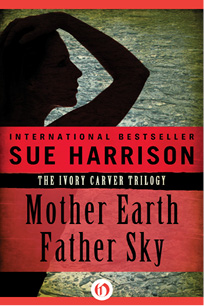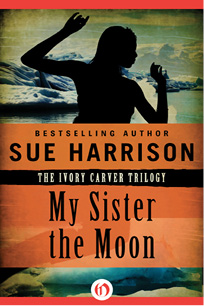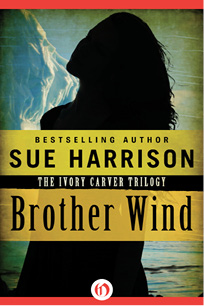Brother Wind (63 page)

IKYAK
, p;.
IKYAN
: (Aleut—also
iqyax, iqyas
) canoe-shaped boat made of skins stretched around a wooden frame with an opening in the top for the occupant; a kayak.
KAYUGH
: (Aleut—also
Kayux
) strength of muscle; power.
KIIN
: (Aleut—pronounced “keen”) who?
QAKAN
: (Aleut) the one out there.
SAGHANI
: (Ahtna Athabascan) raven.
SAGHANI S’UZE’ DILAEN
: (Ahtna Athabascan) My name is Raven.
SAMIQ
: (Ancient Aleut) stone dagger or knife.
SHUGANAN
: (Origin and exact meaning obscure) relating to an ancient people.
SHUKU
: (Ancient Tlingit—pronounced “shoe-
KOO
”) first.
SUK
: (Aleut—also
sugh,
ending unvoiced) calf-length, hoodless parka with a standing collar. These garments were often made of birdskins and could be worn inside out (with the feathers on the inside) for warmth.
TAKHA
: (Ancient Tlingit—pronounced “tawk-
HAW
”) second.
TUGIDAQ
: (Aleut) moon.
TUGIX
: (Aleut) aorta, large blood vessel.
UGHELI
: (Ahtna Athabascan; predicate adjective) a good thing. It is good.
UGYUUN
: (Aleut) cow parsnip or wild celery (Poochki, Russian). A plant useful for food, dyes, or medicine. The peeled stalks when cooked taste somewhat like rutabaga. The stalk’s outer layer contains a chemical that can cause skin irritation.
ULAKIDAQ
: (Aleut) multitude of ulas; group of houses.
ULAQ
, pl.
ULAS
: (Aleut—also ulax) dwelling dug into the side of a hill, raftered with driftwood and/or whale jawbones, and thatched with sod and grass.
UTSULA’ C’EZGHOT
: (Ahtna Athabascan) His/her tongue is crooked. He/she lies.
WAXTAL
: (Aleut) desire; pity.
The native words listed here are defined according to their uses in
Brother Wind.
As with many Native languages that were recorded by Europeans, there are multiple spellings of almost every word as well as dialectal differences.
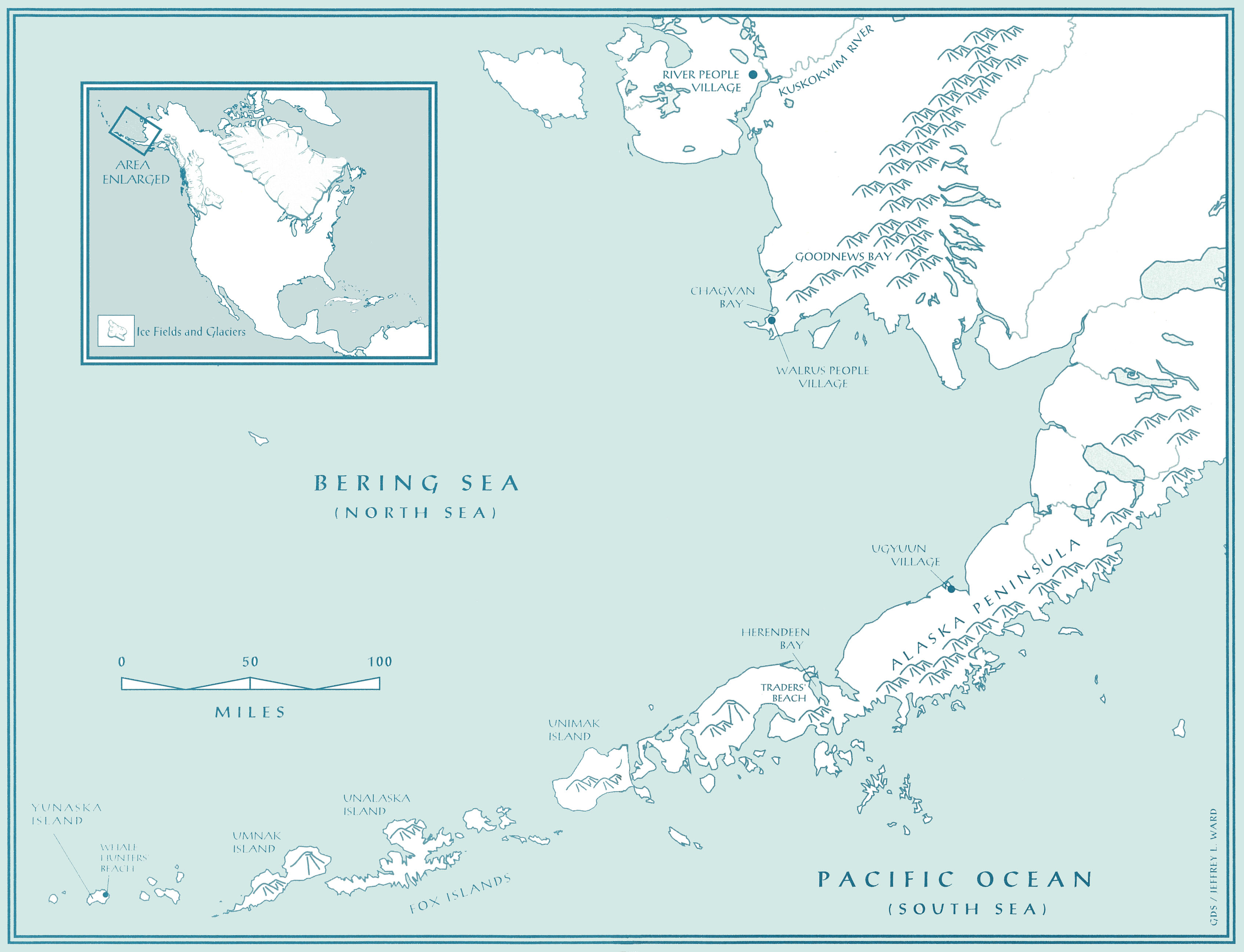
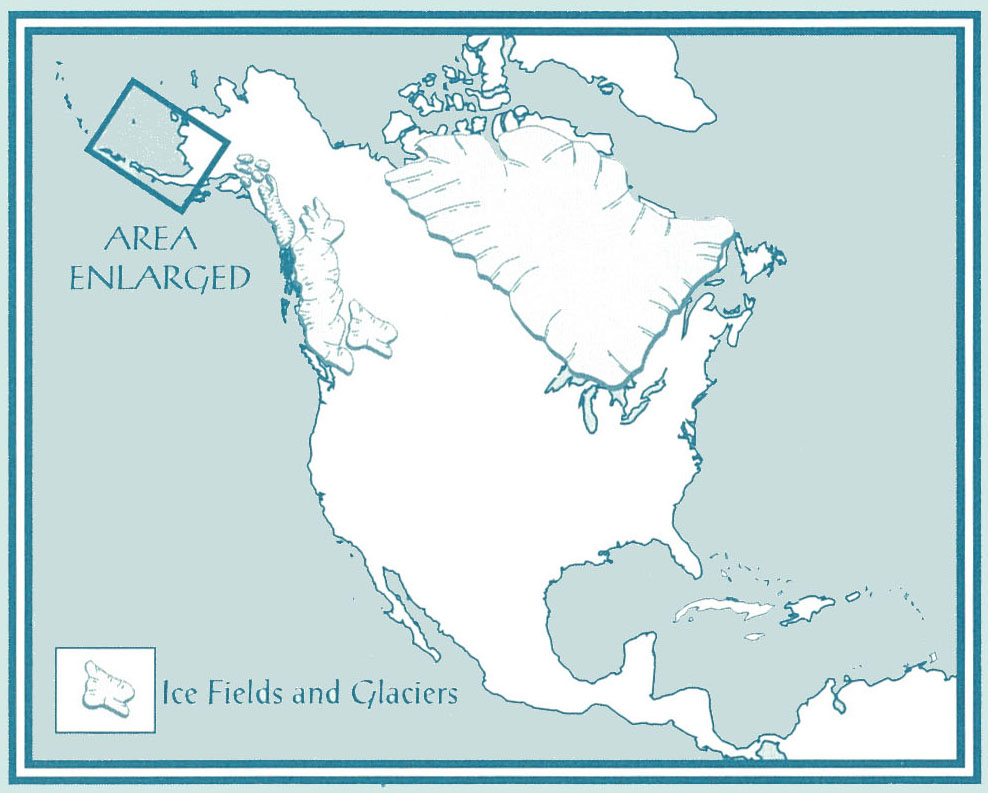
U
PON COMPLETION OF
BROTHER WIND
,
the final book of the trilogy which includes
Mother Earth Father Sky
and
My Sister the Moon,
I must leave characters who, during the past seventeen years, have been a very real part of my life. But though I am leaving “old friends,” I have acquired many new friends, and to these new friends—my readers—I extend my most sincere appreciation. I find constant delight in your curiosity, your intelligence, and your enthusiasm.
My heartfelt thanks go to all the members of my family who have been so supportive—especially my husband, Neil, and our children, Neil and Krystal, and to my parents, Bob and Pat McHaney, and my grandfather Bob McHaney, Sr. I also much appreciate all those relatives, friends, and booksellers who have formed a network of support for my work across the United States and Canada and throughout the world.
Once again, I thank Dr. William Laughlin and his daughter Sarah. This trilogy could not have been written without their generosity in sharing their expertise and research findings.
My gratitude to Mike and Rayna Livingston, Mark McDonald, Gary Kiracofe, Dr. Richard Ganzhorn, and those previously acknowledged in
Mother Earth Father Sky
and
My Sister the Moon
for their contributions of time and knowledge.
Others who have recently lent me books from their personal libraries or shared their expertise include Bob Mecoy, Ann Chandonnet, Mr. and Mrs. James Waybrant, Mr. and Mrs. Bob Blanz, Abi Dickson, Denise Wartes, Warren St. John, Bonnie Chamberlain, Larry Kyle, Ross Blanchard, Roger and Annette McHaney, and Patricia Walker. My sincere thanks to all of you, and also to Forbes McDonald for sharing his experiences fishing Alaskan waters.
My appreciation to those who again waded through cumbersome pages of the
Brother Wind
manuscript in various drafts: my husband, my daughter, my parents, my sister Patrica Walker, and my friend Linda Hudson. Thank you all!
Thanks also to Sandy Benson for typing my research notes, and to my husband for his computer work on the map and genealogy.
I would be remiss if I did not acknowledge the Alaska Native Language Center, located at the Fairbanks campus of the University of Alaska. The materials it has published on native Indian, Aleut, and Eskimo languages of Alaska are truly a gift to the world.
I respect and esteem the many authors whose books and articles—from the early writings of Veniaminov to recent papers yet awaiting publication—have been the foundation on which I constructed my stories. Though the names number well into the hundreds, space permits me to mention only a few: Lydia Black, Raymond Hudson, William S. Laughlin, Steve J. Langdon, George Dyson, George L. Snyder, George D. Fraser, David W. Zimmerly, F. Krause, Derek C. Hutchinson, Otis T. Mason, Patricia H. Partnow, Waldemar Jochelson, Alés Hrdlicka, Margaret Lantis, Ivan Veniaminov, Ethel Ross Oliver, Farley Mowat, Richard K. Nelson, Frances Kelso Graham, Barry Lopez, John McPhee, Howard Norman, Edna Wilder, James Kari, Knut Bergsland, Moses Dirks, and Lael Morgan.
Any historical or scientific errors in my fiction are solely my own and not the fault of the researchers and writers whose work I have cited.
And finally, all my gratitude to my agent, Rhoda Weyr, and to my editors, Bob Mecoy and Ellen Edwards, who all have the ability to smooth out rough roads and round off jagged edges. Their enthusiasm, insight, and professionalism make them a delight to work with.
Sue Harrison grew up in Michigan’s Upper Peninsula and graduated summa cum laude from Lake Superior State University with a bachelor of arts degree in English languages and literature. At age twenty-seven, inspired by the cold Upper Michigan forest that surrounded her home, and the outdoor survival skills she had learned from her father and her husband, Harrison began researching the people who understood best how to live in a harsh environment: the North American native peoples. She studied six Native American languages and completed extensive research on culture, geography, archaeology, and anthropology during the nine years she spent writing her first novel,
Mother Earth Father Sky
, the extraordinary story of a woman’s struggle for survival in the last Ice Age. A national and international bestseller, and selected by the American Library Association as one of the Best Books for Young Adults in 1991,
Mother Earth Father Sky
is the first novel in Harrison’s critically acclaimed Ivory Carver trilogy, which includes
My Sister the Moon
and
Brother Wind
. She is also the author of
Song of the River
,
Cry of the Wind
, and
Call Down the Stars
, which comprise the Storyteller trilogy, also set in prehistoric North America. Her novels have been translated into thirteen languages and published in more than twenty countries. Harrison lives with her family in Michigan’s Eastern Upper Peninsula.
All rights reserved under International and Pan-American Copyright Conventions. By payment of the required fees, you have been granted the non-exclusive, non-transferable right to access and read the text of this ebook onscreen. No part of this text may be reproduced, transmitted, downloaded, decompiled, reverse engineered, or stored in or introduced into any information storage and retrieval system, in any form or by any means, whether electronic or mechanical, now known or hereinafter invented, without the express written permission of the publisher.
This is a work of fiction. Names, characters, places, and incidents either are the product of the author’s imagination or are used fictitiously. Any resemblance to actual persons, living or dead, businesses, companies, events, or locales is entirely coincidental.
Copyright © 1994 by Sue Harrison
Cover design by Mumtaz Mustafa
978-1-4804-1193-7
This edition published in 2013 by Open Road Integrated Media
345 Hudson Street
New York, NY 10014

